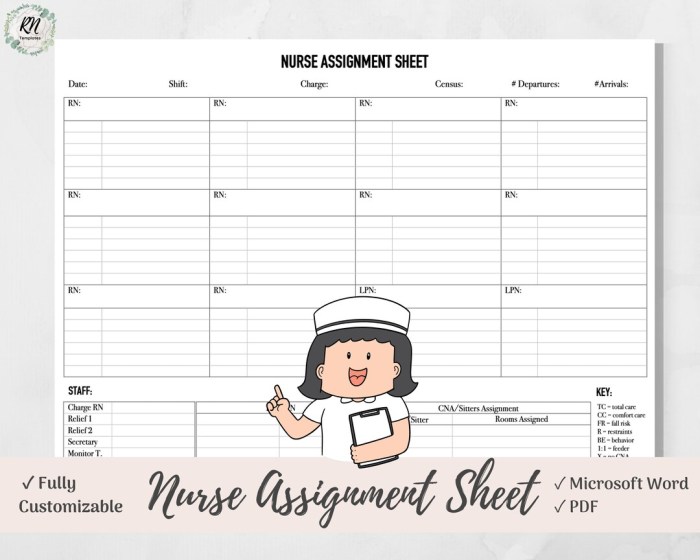A charge nurse is making assignments for nursing personnel – In the realm of healthcare, the charge nurse holds a pivotal role in ensuring the efficient and effective utilization of nursing personnel. This article delves into the intricate process of assignment-making, exploring the factors considered, strategies employed, and ethical considerations involved in this critical task.
A charge nurse’s ability to assess patient needs, evaluate nursing staff capabilities, and prioritize patient safety is paramount in optimizing patient outcomes. This article provides a comprehensive overview of the complexities and responsibilities associated with nursing assignment, offering valuable insights for healthcare professionals.
Assessment of Patient Needs

When assessing patient needs, the charge nurse considers factors such as the patient’s condition, acuity level, treatment plan, and overall health status. Special attention may be required for patients with complex medical conditions, multiple comorbidities, or who are at risk for complications.
Patient Acuity
Patient acuity is a measure of the level of care required by a patient. Higher acuity patients require more frequent monitoring, complex interventions, and skilled nursing care. The charge nurse uses acuity scores or assessment tools to determine the appropriate level of nursing care for each patient.
Evaluation of Nursing Staff Capabilities

The charge nurse evaluates the skills and experience of nursing personnel through various methods, including performance evaluations, competency assessments, and observations. This assessment helps determine which nurses are best suited for specific assignments based on their knowledge, skills, and abilities.
Competency Assessments
Competency assessments are standardized tests or evaluations that measure a nurse’s ability to perform specific tasks or procedures. They provide objective evidence of a nurse’s competence and proficiency.
Considerations for Patient Safety
Assigning nursing personnel involves ethical and legal considerations. The charge nurse ensures that nurses are competent and qualified for their assignments to maintain patient safety. Policies and procedures are in place to guide assignment decisions and protect patients from harm.
Scope of Practice
Nurses must be assigned tasks within their scope of practice, which is defined by their education, training, and licensure. Assigning nurses to tasks outside their scope of practice can compromise patient safety and violate ethical and legal standards.
Strategies for Effective Assignment
| Strategy | Advantages | Disadvantages |
|---|---|---|
| Total Patient Care | Promotes continuity of care, improves patient satisfaction | Requires highly skilled nurses, may lead to uneven workload |
| Functional Nursing | Efficient use of nursing resources, reduces duplication of effort | May result in fragmented care, lessens nurse-patient relationships |
| Primary Nursing | Builds strong nurse-patient relationships, promotes holistic care | Requires additional resources, may not be suitable for all settings |
| Team Nursing | Combines the benefits of different strategies, fosters collaboration | May require more coordination and communication |
Communication and Collaboration: A Charge Nurse Is Making Assignments For Nursing Personnel
Effective communication between the charge nurse and nursing staff is crucial for ensuring clear and accurate assignments. The charge nurse uses various tools and techniques to facilitate communication, such as assignment boards, verbal handoffs, and electronic communication systems.
Assignment Boards
Assignment boards provide a visual representation of patient assignments and allow for easy tracking and monitoring of nurse workload.
Monitoring and Evaluation
The effectiveness of nursing assignments is monitored through various methods, including performance metrics, patient feedback, and quality improvement initiatives. Feedback from nursing staff is essential for identifying areas for improvement and optimizing assignment practices.
Performance Metrics
Performance metrics, such as nurse-to-patient ratios, patient satisfaction scores, and medication administration errors, provide objective measures of the quality of nursing care and the effectiveness of assignment decisions.
Legal and Regulatory Considerations

Nursing assignments must comply with legal and regulatory requirements. State and national regulations govern the scope of practice for nurses and the delegation of nursing tasks. Assigning nurses to tasks outside their scope of practice can have legal implications.
Scope of Practice
Nurses must be assigned tasks within their scope of practice, which is defined by their education, training, and licensure. Assigning nurses to tasks outside their scope of practice can compromise patient safety and violate ethical and legal standards.
Future Trends in Nursing Assignment
Emerging trends and technologies are shaping the future of nursing assignments. Artificial intelligence and data analytics may be used to optimize assignment decisions, improve efficiency, and enhance patient outcomes.
Artificial Intelligence, A charge nurse is making assignments for nursing personnel
Artificial intelligence algorithms can analyze patient data, nurse capabilities, and workload patterns to make data-driven assignment decisions. This can improve the accuracy and efficiency of the assignment process.
Expert Answers
What factors does a charge nurse consider when assessing patient needs?
A charge nurse considers factors such as patient acuity, diagnosis, treatment plan, physical and cognitive abilities, and social support when assessing patient needs.
How does a charge nurse determine which nurses are best suited for specific assignments?
A charge nurse evaluates nurses’ skills, experience, competency, and availability when determining the best assignments for each individual.
What are the ethical implications of assigning nursing personnel?
Ethical implications include ensuring that nurses are competent and qualified for their assignments, respecting patient preferences, and maintaining patient confidentiality.